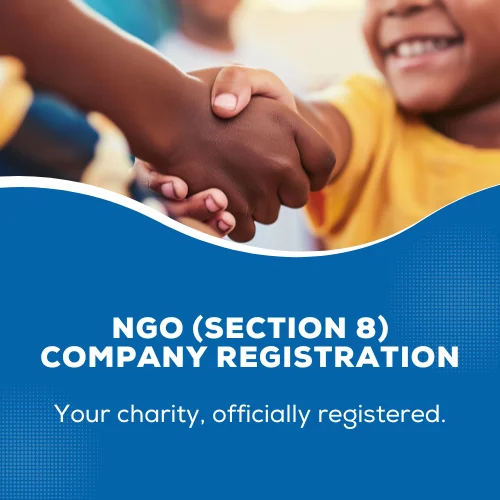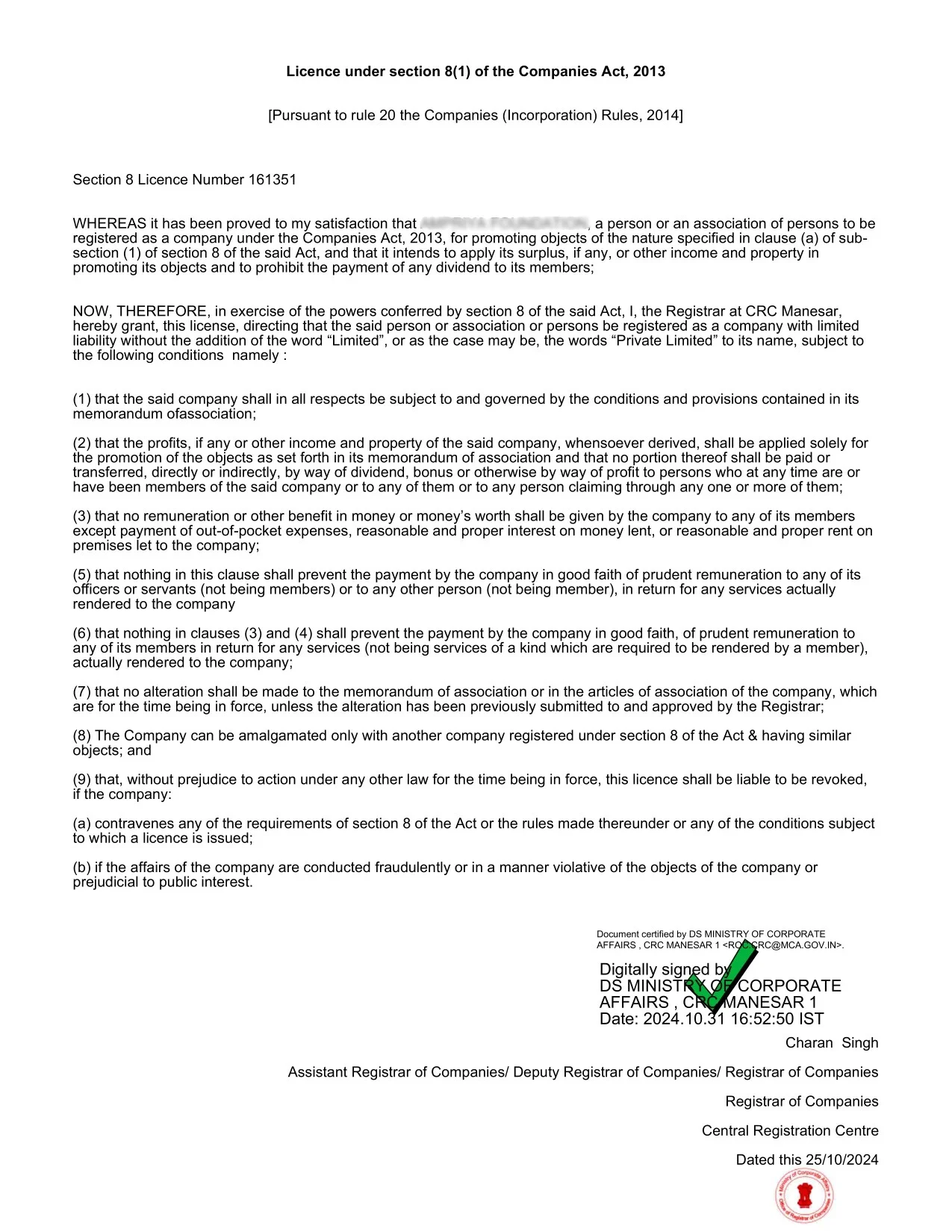NGO (section 8) Company Registration
Your Path to a Successful NGO Starts Here
Unlock Funding Opportunities with Section 8 NGO Registration

Free Consultancy on Government Grants, CSR Funding, and Tax Exemptions
- Get Instant Quote
What’s Included ✅
- MCA Name Approval
- MOA & AOA Drafting (with NGO objectives)
- Certificate of Incorporation (CIN)
- PAN & TAN Allotment
- 2 DSCs (Digital Signatures)
- DIN for Directors
- Bank Account Opening Assistance
- Basic Compliance Guidance for NGO Operations

Exclusive Free Benefits 🎁

Free Zoho Books (Accounting Software)

Free MSME Registration

Free GST Registration

Free Bank Account Opening
- Consultation with CA/CS/Advocate Free for Lifetime
10,000+ Companies & Individuals Put Their Trust In Us
























✅ Clear Guidance: They explained every step in simple, easy-to-understand terms, so I always knew what was happening.
✅ Fast & Efficient: My filing was completed quickly without any unnecessary delays.
✅ Accuracy & Trust: I felt confident knowing my details were handled with care and precision.
✅ Great Support: Any small questions I had were answered patiently and thoroughly.
Give Your Non-Profit Organization the Legal Recognition
In India, a Section 8 Company serves as an NGO. Such companies aim at science, arts, sports, education, and charitable activities. However, these companies don’t function like Trusts or Societies. Profits gained by Section 8 companies are reinvested to support their stated goals instead of being distributed to company members. The Section 8 company registration process falls under the jurisdiction of the MCA, which makes it different from Trusts or Societies, which the State Government Registrars govern.
Choosing NGO (Section 8) company registration through Click To Professionals provides different benefits over Trusts or Societies. The Section 8 structure improves credibility with stakeholders, government departments, and possible donors. Our expert team ensures a smooth NGO registration process at Click To Professionals. With competence in application filing, documentation, and proficient registration, we reduce your worries, making the whole process efficient and seamless.

Introducing Section 8 Company Registration
As per the Companies Act 2013, a Section 8 company is a type of organization dedicated to promoting non-profit activities, such as commerce, arts, science, social welfare, sports, education, research, environmental protection, religion, charity, and so forth. These organizations use their profits to meet their goals and don’t distribute dividends to any shareholder.
The primary purpose of NGO registration in India is to encourage non-profitable objectives. Registering an NGO (Section 8) company requires at least two directors. Also, there is no need for a minimum paid-up capital to establish such entities.
Purpose of NGO (Section 8) Company Meaning
An NGO (non-governmental organization) is a non-profit entity. The prime purpose of founding a Section 8 (NGO) Company is to promote non-profit activities, such as education, healthcare, and reducing poverty. A Section 8 Company is registered under Section 8 of the Companies Act 2013. These non-profit entities are founded for charitable activities.

NGO Registration Benefits
Different benefits of registering an NGO (Section 8) Company according to the Companies Act 2013 are as follows:
No minimum paid-up capital is required for registering an NGO online. You can change the capital structure of the NGO at any time according to the development needs of the organization. Therefore, the funds needed for running business activities can be acquired later through subscriptions and donations from the general public and company members.
Section 8 companies can freely choose a name without adding the term ‘Section 8’ to their name. This offers better naming flexibility.
No stamp duty is charged for an NGO registration in India. Such entities don’t have to pay the stamp duty charged on the MoA or AoA of a public or private limited company.
According to the Income Tax Act, 1961, Section 8 companies enjoy tax benefits of 80G registration. The CARO (Company Auditor’s Report Order) is not applicable for a Section 8 agency.
Section 8 company members have limited liability according to the shares they subscribe to. They have no personal liability for the company losses.
Section 8 companies follow strict legal compliance systems. This ensures that these entities have increased credibility and authenticity compared to Trusts or Societies.
Section 8 company registration promotes a different legal recognition from its members. A registered partnership company can also achieve a Directorship of Section 8 Company by becoming a member in its separate capability. Since it is in constant existence, any member’s entry or exit won’t impact the company’s activities.
NGO Registration Requirements
Some legal requirements should be met before going through the NGO registration steps online. They are as follows:
01
Number of Members
Suppose a Section 8 company functions like a private limited company; the maximum number of members should be 200. However, there is no such limit if it operates like a public limited company.
02
Number of Directors
At least two directors are needed if a Section 8 company works like a private limited company. However, it requires three directors to operate if it functions like a public limited company.
03
Name and Capital Requirement
If a Section 8 entity operates as an NGO, it does not have to use terms like ‘limited’ or ‘private limited’ in its name. As per the Companies Act 2013, Section 8 agencies don’t need to maintain a minimum paid-up capital.
04
Property Management
According to the MoA and AoA of the company, the Board of Directors manages a Section 8 company. However, the Trustees handle other trusts according to the Trust Deed.
05
Non-Profit Objects
Companies with non-profit objects are only eligible for NGO registration online. According to the MoA and AoA, companies with non-profitable goals are known as NGOs. The profits produced by a Section 8 firm should be reinvested in the company or used for charitable purposes. These legal requirements ensure that these companies work transparently and they want to promote social welfare.
06
Annual Compliance
A Section 8 agency should file annual returns and accounts with the ROC to ensure yearly compliance.
07
Closure of a Company
Upon its separation (according to the society's by-laws) and settlement of all debts and liabilities, the society's funds and property may not be distributed equally among all members. Instead, the amount can be given to another organization with the same objectives.
Section 8 Company Registration Eligibility Criteria
Particular eligibility criteria should be fulfilled to establish a Section 8 (NGO) Company in India.
- A limited company, HUF, or an individual can establish a Section 8 Company in India.
- Two or more people who will perform as the Director or Shareholder of the firm should meet all the compliances and requirements of the incorporation of the organization.
- No profit distribution should happen among the directors and members of the company directly or indirectly.
- One of the directors should be an Indian resident.

- The company must have a rock-solid 3-year project plan.
- The company's target must include the promotion of social welfare, sports, the progress of art, science, and education, and financial support to lower-income groups.
- The excess generated should be utilized to fulfill the main target of the company's incorporation.
- The company's directors, members, or founders can’t draw any remuneration in any form of money.
Find a local agent for your legal & registration service
+91 8448094507
Phone No.
info@clicktoprofessionals.com
Get Support
Essential Forms for Section 8 Company Registration
Here are the vital forms needed for Section 8 Company registration and their purposes:
Name of the Form & Purpose
SPICE+ or INC-11
Application for incorporation of Section 8 Company
INC-12
Application for incorporation of Section 8 Company
INC-13
Application for incorporation of Section 8 Company
INC-14
Application for incorporation of Section 8 Company
INC-15
Application for incorporation of Section 8 Company
INC-16
Application for incorporation of Section 8 Company
INC-22
Application for incorporation of Section 8 Company
DIR - 2
Application for incorporation of Section 8 Company
DIR - 3
Application for incorporation of Section 8 Company
DIR - 3
Application for incorporation of Section 8 Company
Name of the Form
Purpose of the Form
- SPICE+ or INC-11
- INC-12
- INC-13
- INC-14
- INC-15
- INC-16
- INC-22
- DIR-2
- DIR-3
- DIR-3
- Application for incorporation of Section 8 Company
- Application for getting the license
- Giving information about the subscribers to the MoA
- Giving information about the registered office of the company
- Giving information about the MoA and AoA of the company
- Issuing Certificate of Incorporation
- Location of registered office
- Consent or directors
- Application for getting DIN
- Hiring of directors
How to Register an NGO (Section 8)
The NGO (Section 8) Company registration process involves the below-mentioned steps:
Funding or Donations of the Section 8 Company
Although a Section 8 Company cannot collect capital through deposits, it can accept public donations. A few methods to raise funds include the following:
- Equity Funding
- Domestic Donations
- Foreign Donations
If a Section 8 Company is registered under the FCRA (Foreign Contribution Regulation Act of 1976), it gets permission for foreign donations. If you need foreign donations urgently, you must request prior permission from the commissioner. Otherwise, FCRA registration applications get accepted 3 years after incorporation.


NGO Registration Documents
Here are the essential documents for NGO registration online:
- Voter ID or DL
- Passport-size photos of shareholders or directors
- Aadhar card
- Latest bank statement and utility bills
- Passport (in case of foreign national or NRI)
- NOC from the landowner
- Latest gas bill, water bill, or electricity bill (should not be older than two months)
- Rent agreement (in case of a rented office)
- Digital Signature Certificate (DSC)
- MoA and AoA
- Incorporation Certificate of a foreign corporate entity (if any)
- Identity and address proof of nominees and subscribers
- Declaration by the first Director Subscriber (no need for an affidavit)
- Declaration of unregistered agencies
- Resolution by the promoter company
Annual Compliances of Section 8 (NGO) Company
Apart from conducting two board meetings annually, a Section 8 Company must comply with some other annual compliances. They are mentioned below:

Filing an Income Tax Return
Section 8 companies should file an ITR, although they are not taxed on profits.

Additional Compliances
Section 8 Companies should have extra compliances to meet particular registrations, such as obtaining 80G registration for tax benefits to donors and getting 12AA registration for tax exemption.

Getting Their Accounts Audited
NGOs should hire a CA to audit their accounts annually.

Filing an Annual Return with the MCA
Section 8 companies should file an annual return with the MCA with other e-filing forms like MGT-7. The yearly return should contain details of company governance, financial activities, and performance.

Filing Financial Statements and Solvency with the MCA
Section 8 companies should file financial statements in Form AOC-4 and maintain Books of Accounts. The statement of accounts and solvency should have details about the organization's costs, income, liabilities, and assets.

Penalty for Non-Compliance
If a Section 8 Company fails to comply with the legal provisions of the Companies Act 2013, the Central Government can revoke its license. Also, the government can revoke the permit if the company conducts its objects fraudulently or violates its objects of establishment.
If a Section 8 Company fails to comply with the provisions of the Companies Act, it will be subject to a fine starting from INR 10 lakh and extending to INR 1 crore. If the directors and officers of the company violate the terms of the Companies Act, they will be punished with a fine of nearly INR 25,000 and up to INR 25 lakhs, or both.
NGO Registration Fees
The NGO registration cost in India includes the following:
Digital Signature Certificate and DIN
INR 3,000
Company name reservation
INR 1,000
AoA, MoA, Government and Incorporation Cost
INR 6,000 to INR 8,000
Professional Charges
INR 8,000 to INR 10,000
Please note that the fees mentioned above are approximate and can differ according to different factors.
Why Choose Click To Professionals for Section 8 (NGO) Company Registration?
Click To Professionals is a reliable partner for companies and entrepreneurs seeking Section 8 Company incorporation in India. We have a team of expert NGO registration consultants. With our smooth online NGO registration services, we ensure the ease of the complicated Section 8 Company registration process. Moreover, we ensure that all legal formalities are met.
Our experienced team of consultants guides clients through the whole registration process. From getting approval for documentation to founding non-profit organizations, we ensure you can work towards charitable functions and social welfare. Our dedicated team of advisors is a call away. Please get in touch with us if you have any questions or queries regarding the registration process.

Frequently Asked Questions (FAQs)
Your Path to a Successful NGO Starts Here
It could seem hard to start a non-profit organisation in India, but with the right help, Online NGO Registration under Section 8 of the Companies Act, 2013, can be easy and beneficial. Starting a legally recognized NGO provides you the capacity to make permanent changes in areas you’re passionate about, including education, health, the environment, or social justice.
This article will show you how to form a Section 8 business step by step, explain the advantages of doing so, and list important things you need to do after registering, such as registering for 80G and 12A for Section 8 companies.
What is registering an NGO online?
Online NGO Registration is the process of registering a non-profit organisation in India via the Internet. Section 8 NGO registration is the most common way for NGOs in India to formally function and get tax breaks. A Section 8 corporation is a unique kind of business that exists only to support religious, educational, or philanthropic goals.
When you create a Section 8 business, you are creating a legal identity that makes sure the government and funders can see and recognise it.
Why should you register your NGO under Section 8?
Section 8 Company Benefits: Section 8 companies don’t have to pay taxes since they are registered under 80G.
How to qualify for 12A registration for a Section 8 firm
Companies incorporated under Section 8 get professional recognition
Members have limited liability.
Different legal entity
Section 8 NGO registration makes it easier for your group to get contributions from other countries, government subsidies, and money from businesses’ corporate social responsibility (CSR) programmes.
How to Register a Business: Step-by-Step Guide
Step 1: Get a Digital Signature Certificate (DSC)
To start Online NGO Registration, all directors must have a valid DSC. This is how you sign papers online on the MCA site.
Step 2: Get a Director Identification Number (DIN)
It is also required for each director to have a DIN in order to start a sec 8 business.
Step 3: Use SPICe+ Part A to reserve a name
You need to fill out the SPICe+ form to ask for permission for your name. Make sure that your name fits the objective of your NGO.
Step 4: Write the Articles of Association (AOA) and the Memorandum of Association (MOA).
These papers explain the company’s goals and policies. They are very important for Section 8 of business registration.
Step 5: Submit the Incorporation Form (SPICe+ Part B)
This form has:
Application for PAN and TAN
Information about the directors
Address of the business
Statement of compliance
Step 6: Give out the Certificate of Incorporation
The ROC gives you the Certificate of Incorporation after checking all the paperwork. This makes your NGO a legal Section 8 business.
Documents Needed to Register an NGO under Section 8
To set up a Section 8 corporation, you will need:
Pictures the size of a passport
PAN for all directors
Proof of address or an Aadhaar card
Utility bill for the office address
NOC from the owner of the property (if needed)
MOA and AOA
Statement of compliance
For a smooth establishment of a sec 8 business, following paperwork must be correct.
12A and 80G registrations after incorporation
Section 8 Company 80G Registration
After you finish registering your NGO online, you may apply for 80G registration so that contributors can deduct their donations from their taxes.
Registering a Section 8 Company with 12A
With a 12A registration, your NGO doesn’t have to pay taxes on its revenue. Even a Section 8 firm would have to pay income tax if it didn’t have this.
You need to submit both 80G and 12A with the Income Tax Department. This makes your NGO seem much more trustworthy.
Section 8 of the Company Registration: Common Mistakes
Incorrect Document Uploads
Before you send in your IDs, photographs, and signatures, make sure they are all correct.
Unclear Goals in MOA
Make sure to clearly state your NGO’s purpose in the MOA, otherwise your section 8 NGO registration might be turned down.
Not applying for 80G and 12A
Filing these late makes it harder for donors to get tax breaks and financing.
Problems with name similarity
Make sure that the name of the NGO is not only distinctive but also not deceptive.
How to Make Sure Your NGO Registration Goes Smoothly Online
Talk to experts who know how to set up a sec 8 business.
Always keep your records and compliance filings up to date.
File using MCA’s official website
Before they run out, renew 12A and 80G.
Keep up with changes in the legislation that affect firms registered under section 8.
Every year, Section 8 companies must comply.
After you register your NGO online, you have to follow ROC rules every year, such as:
Filing Form AOC-4 (money)
Filing Form MGT-7 (yearly return)
Having board meetings
Keeping accurate records of accounts
This maintains your registration as a section 8 NGO up to date and valid. If you don’t follow the rules, you might face fines or even cancellation.
After you sign up, you may raise money
You may raise money for your Section 8 business once you register it by:
Donations for CSR
Donations from other countries (after registering with the FCRA)
Platforms for crowdfunding
Grants from the government
Individual gifts (qualified for 80G benefits)
Having a legitimate 80G registration for a Section 8 firm plus a 12A registration promotes confidence with donors and motivates them to give.
Frequently Asked Questions
Q1. How long does it take to sign up for a Section 8 Company?
If all the paperwork is in order, it usually takes 15 to 20 business days.
Q2. Is it possible for a foreigner to be a director?
Yes, as long as you have the right papers and are legally in India.
Q3. Do you have to be there in person to register?
No, Online NGO Registration with DSC takes care of everything.
Q4: How long do 80G and 12A last?
At first, both are good for five years and need to be renewed.
Conclusion
t may seem hard to start an NGO at first, but Online NGO Registration under Section 8 of the Companies Act makes it easier by giving you a clear structure and tax benefits. With Online CA Consultation, the process becomes even smoother, helping you avoid legal and compliance hurdles.
When you set up a Section 8 corporation, you’re not simply launching a non-profit; you’re also creating a meaningful platform for change. Companies that are registered under Section 8 are the best choice for serious changemakers since they provide advantages including 80G registration, 12A registration, legal legitimacy, and easy financing.
Start your adventure now. Section 8 NGO registration can help your concept become a reality in a legal, moral, and successful way.
Contact Us:
Call us at +91 84480 94507 or email us at info@clicktoprofessionals.com for any queries.
Choose Click To Professional – Your Partner in Business Success.











